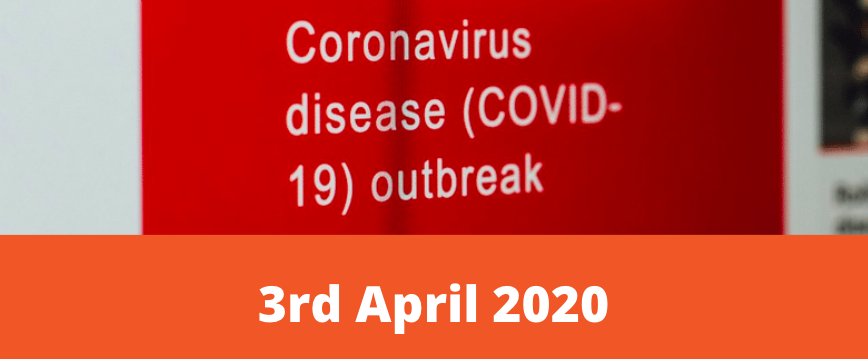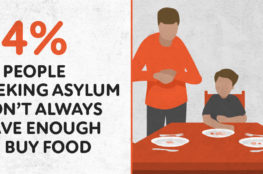Our weekly summary of ongoing advocacy initiatives, interesting surveys and research, government developments and useful resources. Contact us if you’d like to get this update directly into your inbox!
1. Ongoing advocacy initiatives
Call for all migrants to be granted leave to remain: RAPAR have written an Open Letter, now platformed as a petition, that is calling on the UK Prime Minister and the Taoiseach of Ireland to grant leave to remain to all migrants, thereby ensuring access to healthcare, housing and food for all. You can share the campaign on social media through the hashtag #healthandsafetyforall.
Call for wifi in asylum properties: SYMAAG, based in South Yorkshire, have launched a petition calling on Mears, the asylum housing provider in Scotland, Northern Ireland and the North East Yorkshire & Humberside region, to install a wifi connection in all their asylum properties, enabling their service users to access vital information regarding the public health crisis, contact support workers and family remotely, access resources to continue their children’s education and for entertainment purposes amid fears for their mental health in a communication blackout during periods of isolation.
Letter to Home Secretary from chairs of APPGs on Refugees and Migration: The chair of the APPG for Refugees, Thagam Debbonaire MP, and the chair of the APPG on Migration, Kate Green MP, wrote to the Home Secretary on Wednesday with recommendations and seeking clarification on a number of issues including the Government’s plans for the extension of temporary short term visas and the communication of their availability to temporary residents in the UK; the protection of those at risk of or reporting exploitation and abuse during the pandemic, as well as the continuation of the full protection of the NRM for vulnerable individuals; and assurances that any extended period of leave from the UK as a result of Covid-19 will not be considered a break of continuity of residence, thereby jeopardizing any future application for indefinite leave to remain.
Campaign to amend Funeral Support Arrangements: The Unity Centre Glasgow have written to the Home Secretary with an urgent request for an amendment to Home Office policy on provision for the cost of funerals for asylum seekers. As it currently stands, support may be refused on the grounds that the deceased was not considered ordinarily resident. The letter asks that the Home Office reconsider this guidance in these unprecedented and exceptionally difficult times, so that the deceased and their loved ones may be afforded the dignity and humanity they deserve. For more information please contact [email protected].
UNHCR, IOM, OHCHR and WHO joint press release: On 31st March, the UNHCR, IOM, OHCHR and WHO issued a joint press release stating that the rights and health of refugees, migrants and stateless people must be protected in the Covid-19 response. You can read the press release here.
Call to increase funding for refuges to protect survivors of domestic abuse: Solace Women’s Aid and the Public Interest Law Centre joined others this week in calling for domestic violence services to be adequately resourced during the pandemic. Writing to the MHCLG, they asked that critical funding be provided to Local Authorities to provide safe housing and support for all those fleeing domestic abuse, drawing attention to the need for this funding to include those without secure immigration status or recourse to public funds, who by virtue of these conditions are particularly vulnerable to abuse.
Concerns raised around the safety of residents in Initial Accommodation Centres: The Independent published an article over the weekend highlighting concerns around the ability of residents in the Initial Accommodation Centre in Wakefield to practice social distancing and self-isolate.
Welsh Refugee Coalition letter to the Welsh Government: The Welsh Refugee Coalition have written to the Welsh Government outlining measures that they could take using devolved powers to protect migrants, refugees and people seeking asylum during the pandemic. This includes suspending all NRPF conditions in Wales, widening access to free school meals and educational maintenance allowance and an end to all healthcare charging. The Welsh Government recently announced a new £10 million fund to house people sleeping rough in Wales and made clear that this should include people with NRPF.
Calls for increased asylum support rates: Freedom from Torture have this week written to the Home Secretary and Chancellor asking for an increase of £20 per week to section 98, section 95 and section 4 support for the next 12 months, as per the increase in Universal Credit, to address concerns that the current asylum support rates do not enable people to meet their essential living needs during the public health crisis and stay safe. The letter can be found here. Asylum Matters is also planning further advocacy on support levels, in line with our long-standing call for an increase to support levels to 70% of income support, which we’ve deemed to be the minimum amount people seeking asylum would need to meet their essential living needs, both during and beyond any pandemic. We’ll keep you posted with any updates on this work and opportunities to get involved.
2. Pause on evictions from asylum accommodation for three months
On Friday 27th March, the Home Office minister Chris Philp wrote to the Red Cross to announce that evictions of people on S95 and S4 support from asylum accommodation will be paused for the next three months, to be reviewed at the end of June. This applies to both people whose asylum claim has been refused and those who have been granted refugee status. Newly granted refugees may move to live elsewhere should they choose to after receiving notification of the status but are invited to inform Migrant Help of this decision as the pause will be automatic.
This is a very welcome decision, though one that came too late for some who had their asylum support discontinued during the first few weeks of the social distancing regulations. Further guidance is awaited, but in the meantime we understand that people in this situation can get in touch with the Home Office, via Migrant Help, to ask for their support to be reinstated. In addition, ASAP have advised that they appeal the discontinuation to the Asylum Support Tribunal, and these approaches could be pursued in parallel. You can find more information on the ASAP factsheet here.
In a separate letter sent to Local Authorities the Home Office announced that as a result of the halt on evictions, accommodation providers have been instructed to procure additional properties and have permission to do so in areas where the Local Authority has not previously agreed to its use as a dispersal area, a temporary departure from previous Home Office policy which required agreement from a Local Authority on the suitability of an area for dispersal. As a result, we may see new dispersal areas opening up over the coming weeks.
3. Asylum Support Tribunal rules that destitute asylum seeker be provided with asylum support
The High Court this week has overruled a refusal of section 4 asylum support, ordering the Home Secretary to give a destitute refused asylum seeker accommodation and subsistence support to self-isolate during the coronavirus pandemic. Though this victory applies only to the individual client in the case, it gives some indication of the direction the courts are taking during the pandemic.
4. Useful resources
The following resources have been shared around various networks this week:
- The Good Practice and Partnerships team at Refugee Action have developed the incredibly useful Coronavirus Asylum Handbook which brings together frontline organisations’ approaches and strategies (both immediate and longer term) to deliver support in the current context. A great resource for sharing good practice and finding out how others are tackling the barriers. Contributions are welcomed, please contact [email protected] for more info.
- You can check and contribute to The Ultimate Webinar Livestreaming List which has a vast array of webinar options so you can find the right one for your purpose.
- The Frameworks Institute continues to produce very helpful documents to assist with the language and framing we use in our communications during the Covid-19 pandemic. You can access these documents here or sign up to receive their newsletter here.
- Refugee Council have shared a handy document with a concise bullet point list of Covid-19 related info titled “Asylum in a Sentence”. See attached. Please also be sure to check the Refugee Council’s web page for regular and detailed Covid-19 updates on policy and practice.
- JCORE have produced these Translated Guides to Zoom which now include English, Arabic, French, Polish, Somali, Tigrinya and Kurdish.
- The NRPF network have produced a useful web page with a link to a detailed factsheet aimed at Local Authorities, with info on support for people with NRPF, including good practice already being undertaken by councils and supporting people during the pandemic when social services’ duties are engaged; rights and entitlements of people with NRPF to government assistance being provided during the pandemic; and changes to Home Office immigration and asylum processes.
- Free online ESOL resources have been helpfully collated in a post at Leeds Migration Partnership blog for students of a range of levels who are keen to continue their studies (where possible).




